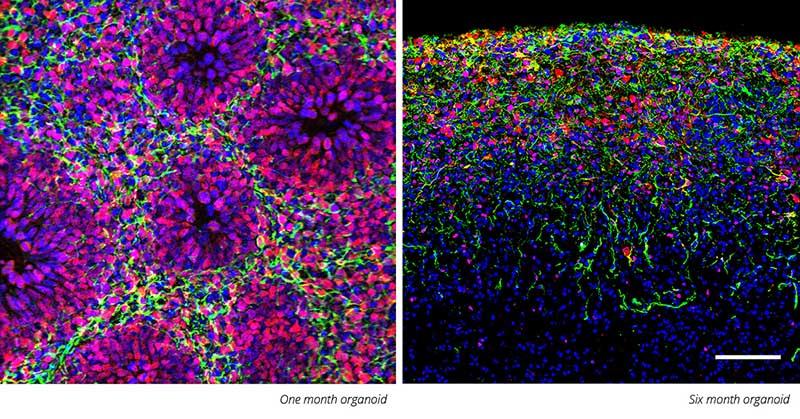New Research Models Offer Promise for Understanding the Human Brain and Finding Pathways to Therapies, But Also Raise Profound Ethical Questions
News Release
By Sara Frueh
Last update April 8, 2021
WASHINGTON — New models for studying the human brain — human neural organoids, transplants, and chimeras — show promise for advancing understanding of the brain and laying the groundwork for new therapeutic approaches to brain diseases that have so far proved hard to treat, says a new report from the National Academies of Sciences, Engineering, and Medicine.
However, as these models advance, they raise profound ethical questions about the blurring of distinctions between human beings and nonhuman animals, the welfare and rights of research animals, and consent from the people whose cells are used for this research, among other issues, the report says.
“The promise of these novel human brain cell models is that they will contribute to understanding the brain and may pave the way to transformative therapies that relieve the significant burden of neurological and psychiatric diseases,” said Joshua Sanes, co-chair of the committee that wrote the report, and founding director of the Center for Brain Science at Harvard University. “However, this promise must be carefully weighed against the ethical concerns that such models raise. The brain is the organ that, more than any other, gives humans their individual identity, so there are unique sensitivities around research on brain cells and tissue.”
Many ethical concerns raised by current and near-future research can be addressed by existing oversight mechanisms, the report says, but some issues will need to be reassessed as the science develops — for example, concerns raised as neural organoids become more complex, or issues related to the generation of chimeras in nonhuman primates. Such issues would benefit from discussion at a national level, where a wide range of viewpoints and disciplinary backgrounds could be included.
The report offers findings to provide guidance for scientists, clinicians, regulators, and the general public as they weigh the value of this research against the ethical concerns it raises. As directed by the charge to the committee, this report provides findings, but not specific recommendations.
New models offer promise for increasing understanding, paving way to therapies
The dearth of treatments for devastating neurological diseases such as Alzheimer’s disease and Parkinson’s disease is due in large part to the difficulty of conducting research on the human brain, the report says. While research using animal models has advanced understanding, progress is stymied by serious limitations of those models, which often fail to capture key features of human diseases. Direct studies of human brain could circumvent this limitation in principle, but they are infeasible for a host of technical, legal, and ethical reasons.
In response, researchers have developed new models for research, including:
- Human neural organoids, which are three-dimensional aggregates of human neural cells — currently no more than 4 millimeters in diameter — grown in the laboratory from stem cells. Neural organoids exhibit some developmental, cellular, and molecular features seen in portions of fetal human brains.
- Human neural transplants, which insert human stem cells into brains of nonhuman animals. These transplants enable the study of human neurons, glia, and other brain cells in the context of the behaviors of a whole nonhuman animal.
- Human neural chimeras, which are a special case of transplants in which stem cells are injected into a nonhuman animal very early in embryonic development. They intermingle with the host cells that form the brain, populating it from the earliest stage. To date, chimeras that develop to fetal stages or later have only been generated using rodent stem cells put into rodent hosts, but research in this area is advancing rapidly, and it is possible that viable chimeras could one day be generated from human cells injected into the blastocyst of a nonhuman primate.
These are powerful models that provide novel ways to understand normal and abnormal human brain development, analyze disease mechanisms, and assess therapeutic approaches, the report says. They have the potential to be invaluable additions to human studies and animal models and to pave the way to transformative therapies that relieve the significant burden of neurological and psychiatric diseases. However, this promise must be carefully weighed against the ethical and governance concerns that such models may raise, the report says.

Complex ethical issues will benefit from ongoing dialogue
Because of the human suffering and mortality caused by brain disorders and limitations of current animal disease models, there are strong moral arguments in favor of research using organoids, transplants, and chimeras derived from human cells, so long as such research is balanced with other ethical considerations such as ensuring animal welfare and appropriate consent from donors of human biological materials, the report says.
One ethical concern is whether previously collected and deidentified biological materials should be used for this type of research without the specific consent of the people who originally donated the tissues. Another relates to animal welfare. As transplantation and chimeric models of human brain diseases become better able to model key disease features, it is likely that research animals will show behaviors that resemble distressing human symptoms. Additionally, if host animals acquire altered behaviors atypical of their species, such as new forms of problem-solving or substantially different, complex social interactions, objections to such research might increase. These concerns would be greater if nonhuman primates are used as hosts.
In addition, these studies raise moral, ethical, and religious concerns regarding mixing of humans and other animals — for example, that animals might acquire attributes that could be viewed as distinctively human — or threats to human dignity.
In exploring these issues, the committee heard from biomedical scientists, ethicists, religious scholars, and legal experts. “These discussions provided the committee with valuable insights, and it’s important to continue such dialogues as the science develops,” said committee co-chair Bernard Lo, director emeritus of the program in medical ethics at the University of California, San Francisco, and president emeritus of the Greenwall Foundation.
Engaging the broader public in such discussions would also offer many benefits, in terms of informing the public about the research, identifying public concerns, and influencing science policy, the report says. In a pluralistic society, the diversity of religious and secular views on these issues must be respected. The U.S. currently lacks robust mechanisms to facilitate this public engagement.
Some oversight mechanisms will need reassessment as science develops
The report offers findings about oversight mechanisms for various forms of research:
At present and in the near term, ethical concerns about this research are addressed by current oversight mechanisms, which include stem cell research oversight (SCRO) committees, Institutional Animal Care and Use Committees (IACUCs), Institutional Review Boards (IRBs), funding restrictions, and professional guidelines. However, some oversight bodies might need additional expertise in neural transplant or chimera research or evaluating behavior of transplanted or chimeric animals.
Oversight will need be reassessed as the science develops.
Neural organoids do not raise issues that require additional oversight unless they become significantly more complex.
Some future research — including more complex human neural organoids, transplants, and chimeras, and generation of transplants and chimeras in nonhuman primates — will benefit from additional discussion of ethical and social issues that extend beyond current reviews of individual research projects. There are advantages to carrying out such discussions at the national level, where a wide range of viewpoints and disciplines could be convened. However, there is no current body that addresses this need.
A three-tiered system of oversight has been recommended or adopted in other areas of biomedical research: research that may be carried out under current oversight, research that requires heightened oversight, and research that should not be carried out at this time.
The study — undertaken by the Committee on Ethical, Legal, and Regulatory Issues Associated with Neural Chimeras and Organoids — was sponsored by the National Institutes of Health and the Dana Foundation. The National Academies of Sciences, Engineering, and Medicine are private, nonprofit institutions that provide independent, objective analysis and advice to the nation to solve complex problems and inform public policy decisions related to science, technology, and medicine. They operate under an 1863 congressional charter to the National Academy of Sciences, signed by President Lincoln.
Contact:
Sara Frueh, Senior Media Officer
Office of News and Public Information
202-334-2138; e-mail news@nas.edu
Featured Publication
The Emerging Field of Human Neural Organoids, Transplants, and Chimeras: Science, Ethics, and Governance
Consensus Study Report
·2021
Each year, tens of millions of individuals in the U.S. suffer from neurological and psychiatric disorders including neurodegenerative diseases such as Alzheimer's Disease and Parkinson's Disease, and psychiatric disorders such as autism spectrum disorder, depression and schizophrenia. Treatments f...
View details
More like this
Discover
Events
Right Now & Next Up
Stay in the loop with can’t-miss sessions, live events, and activities happening over the next two days.
NAS Building Guided Tours Available!
Participate in a one-hour guided tour of the historic National Academy of Sciences building, highlighting its distinctive architecture, renowned artwork, and the intersection of art, science, and culture.




